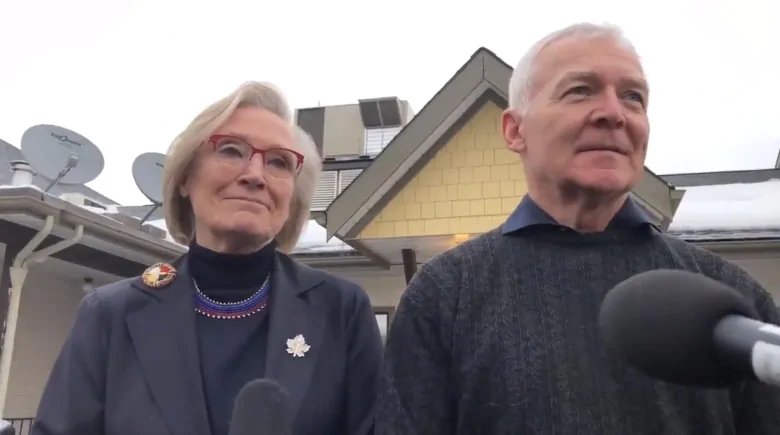Talks with Wet'suwet'en hereditary chiefs set for 2nd day in northern B.C.

The hereditary chiefs of the Wet’suwet’en are set to meet for a second day with senior federal and provincial ministers in northwestern B.C. on Friday, as they try to break an impasse in a pipeline dispute that has sparked weeks of protests across the country.
Federal Crown-Indigenous Relations Minister Carolyn Bennett and B.C. Indigenous Relations Minister Scott Fraser seemed optimistic before meetings began in Smithers, B.C.
“It feels like a good day,” said Fraser.
“The important thing is that we’re willing to roll up our sleeves and get to the complex and difficult issues, and we began that yesterday and we’re going to continue that today.”
‘Heavy discussions’ ahead
The first round of meetings Thursday were described as preliminary discussions, setting the stage for deeper negotiations on Friday.
“This first day … lays out the groundwork. [On Friday] we’ll get into the heavy discussions,” Hereditary Chief Na’moks told CBC News from Smithers, B.C. on Thursday.
“I expect these to be long days, because they’re getting here late in the game,” he said.
Na’Moks is one of several hereditary chiefs who opposes the Coastal GasLink pipeline set to run through traditional territories of the Wet’suwet’en. The meetings will discuss the $6.6-billion pipeline project, as well as concern around Indigenous rights to land and title.
A previous statement from the Office of the Wet’suwet’en said Prime Minister Justin Trudeau and B.C. Premier John Horgan declined invitations to attend the meetings.
On Friday, Bennett said progress needs to be made before the senior politicians take part.
“We need to do some hard work. We would want any meeting with the prime minister and the premier to be a good meeting,” Bennett said.
The first day of discussions wrapped up Thursday after about three hours. Fraser said the day was productive and the mood in the room was respectful. The B.C. minister declined to give specifics on progress, saying he didn’t want to “jeopardize anything.”
Na’moks left Wet’suwet’en offices without making a statement, but told CBC that the issues at the heart of the discussions go far beyond a single pipeline project.
“We’ve seen what’s happening across Canada and we have more than a willingness for that to cease, but there has to be some positive, progressive changes — and we’re talking about the relationship between all Indigenous people and Canada and British Columbia and each of the provinces themselves,” said Na’moks, who also goes by John Ridsdale. “That’s the goal here.”

Both the RCMP and Coastal GasLink have agreed to conditions requested by the chiefs to allow the discussions to progress.
No RCMP patrols
Mounties ended patrols along the Morice River Service Road, a critical roadway, while negotiations unfold. The natural gas company agreed to a two-day pause on construction in the area in a similar vein.

The hereditary chiefs’ opposition to a natural gas pipeline cutting across their traditional territory, coupled with their efforts to limit police presence on their lands, have sparked shows of support across the country, which have halted rail service for the past three weeks.
The dispute over the Coastal GasLink pipeline project began months ago, but tensions rose on Dec. 31, when the B.C. Supreme Court granted TC Energy an injunction calling for the removal of any obstructions from roads, bridges or work sites it has been authorized to use in Wet’suwet’en territory.
The RCMP moved in to enforce that injunction on Feb. 6. Hours later, protesters started holding up railway traffic outside of Belleville, Ont., in solidarity with the Wet’suwet’en hereditary chiefs, thwarting freight and passenger rail travel.



